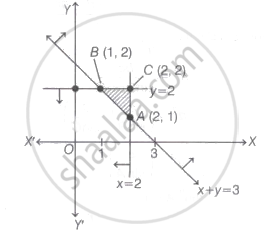Advertisements
Advertisements
Question
If z = ax + by; a, b > 0 subject to x ≤ 2, y ≤ 2, x + y ≥ 3, x ≥ 0, y ≥ 0 has minimum value at (2, 1) only, then ______.
Options
a > b
a = b
a < b
a = 1 + b
MCQ
Fill in the Blanks
Solution
If z = ax + by; a, b > 0 subject to x ≤ 2, y ≤ 2, x + y ≥ 3, x ≥ 0, y ≥ 0 has minimum value at (2, 1) only, then a < b.
Explanation:
We have, z = ax + by; a, b > 0
Subject to constraints x ≤ 2, y ≤ 2, x + y ≥ 3, x ≥ 0, y ≥ 0
On taking given constraints as equation, we get the following graph

Here, ABCA is the required feasible region whose corner points are A (2, 1), B (1, 2) and C(2, 2).
Since, It is given that z =ax+ by; a, b > 0 has minimum value at (2, 1).
∴ Value of z at (2, 1) < value of z at (1, 2)
⇒ 2a + b < a + 2b
⇒ a < b
shaalaa.com
Is there an error in this question or solution?
